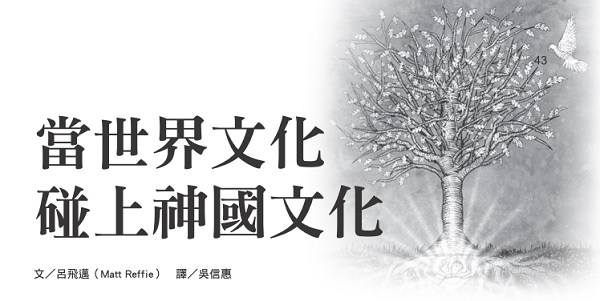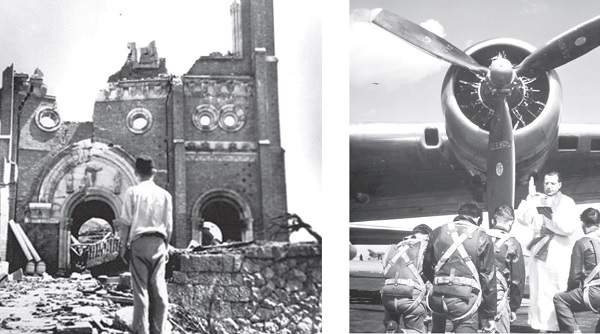When world culture meets the culture of the Kingdom of God
Translated by Wu Xinhui

Eliminating our own opinions allows us to get to know each other more deeply, and even see the core of the same belief
There is a little-known thing in the history of World War II. The second atomic bomb was dropped on Nagasaki, Japan, destroying not only Japan's largest Christian community but also the orphanage run by nuns that stood in the Urakami district. When we think of the end of a war, we imagine planes, tanks, and military bases being wiped out, not the destruction of women and children, let alone a group of God-fearing Christians.
Many people don't know that before setting off, the fighter planes and pilots carrying the atomic bombs were blessed before setting off. Fr. George Zabelka's son was a clergyman stationed in the army at that time. At that time, he felt that blessing soldiers going out to war was his duty and a sign of patriotism. The horrors caused by World War II in various places and the challenges it posed to people's lives made everyone feel relieved that the war was finally over. However, when we know this story, we may have different reflections!

▲The atomic bomb was dropped on Nagasaki, Japan, destroying the largest Christian community in Japan and destroying the entire city.
▲Many people don’t know that before departure, the fighter planes and crews carrying the two atomic bombs were blessed by military pastors before setting off.
Kingdom Consciousness VS World Consciousness
According to a 2005 Gallup poll, 57% Americans believed that dropping the atomic bomb on Japan was right. Americans at 80% believe that "the atomic bomb ended World War II and also saved American lives." Until recently, I saw Christian posts online discussing World War II. Many people still felt that "Japan got the retribution it deserved." Dropping the atomic bomb was not only necessary, but also the key to victory, and should be celebrated.
Regardless of whether the atomic bomb was needed to end the war, these data and remarks reveal that Christians have a very cunning sense of self-identity. Does the Bible say that some people’s lives are more noble? Or "God created man in his own image" (see Genesis 1:27)? These statistics show that many people limit their measurement to the value of American life rather than the value of all human lives. American culture (or other cultures) does believe that some lives are more valuable, but this is not consistent with Christian culture. The Kingdom consciousness that Christians should have is often defeated by the worldly consciousness. When Father Zabekah blessed the military planes flying to Nagasaki, he did so out of his identity as an American rather than as a Christian. When he saw the bombed church and orphanage, he regretted that his patriotism and duty were stronger than his status as a Christian.
In fact, American lives are no more valuable than Japanese lives. The apostle Paul tried his best to get rid of the concept of Christians dividing life according to cultural status. He said in Colossians: "There is neither Greek nor Jew, circumcision nor uncircumcision, barbarian, Scythian Man, slave and free, but Christ includes all and dwells in every one." (Colossians 3:11) The first identity of a Christian should be "in Christ" and "Christ in all." "In us", that is, our culture must be interpreted and expressed from a state of connection with Christ. From a historical perspective, we often interpret Christ from the perspective of our own culture, but we do not yield to Christ to change and renew. In this way, we shape Christ in our own image rather than being made by Christ in His image.
Retention and renewal of cherished habits
So how do we pursue the culture of the kingdom of God in a culture that has already taken root? First of all, worldly culture is not always contrary to God’s will. God confused human language due to the Tower of Babel incident, thus creating many races and cultures with their own characteristics. We are all equally created by God to be different people, and the world is more diverse because of it. No one person or single culture can create the rich and diverse integrated culture that is shared by everyone today.
Every culture has its precious parts. If you only limit yourself to your own culture, it will be a great loss. The key is to identify which parts need to be cherished and preserved, and which parts need to be renewed and remade by God. For example, growing up in an Italian-American family, eating a lot is one of our cultural characteristics. As a child, my father always cooked two pounds of pasta, half for the children and half for himself. A craving for food is something many cultures have in common, but my wife, who grew up in a Swiss-Mennonite family, is exactly the opposite. The Italians ate luxuriously, while the Mennonites were frugal and ate in small portions. Practicing the culture of the Kingdom of God in terms of diet means that I learn to "diet rationed" and my wife learns the dietary concept of "frugaling oneself and treating others richly." Our cultures are also connected to each other because of marriage. The culture of the Kingdom of God does not negate the culture of the world. However, God’s teachings, not to be extravagant and wasteful, and to love your neighbor as yourself, must transcend culture and habits.
Cultural renewal is really not easy! Growing up in an inherent culture, we not only agree with the concepts it promotes, but also feel that it transcends various cultures. Only it is eternal and true and applies to everyone. In pursuing the culture of the kingdom of God, we must admit that our knowledge is incomplete. Many parts of the teachings of the Lord Jesus correct erroneous beliefs. If we can face it honestly and admit that we are partly right and partly wrong, this will enable us to accept and listen with a broad mind. When someone says the sky is purple, please don't directly enable the "Explain Error" function. Listen to the reason first. Maybe this will open a window you haven't seen before. The vastness of God’s kingdom may be beyond the scope of your imagination!
In the parable of the mustard seed, the Lord Jesus said that the kingdom of God is like a small mustard seed. “When it is planted, it grows and becomes larger than any other vegetable, and it produces large branches…” (Mark 4:32) These branches may represent various cultures in the world, which are renewed, shaped, and cultivated by God. Each branch has a unique shape, but is connected to the large trunk that represents Christ. Although people are different, when we look at world culture from this perspective, it can help us accept others and rethink the mentality of arguing with others because of different perceptions, or looking down on other people's beliefs.
Perhaps, by eliminating our own opinions, we can get to know each other more deeply, so that we can see the same core of faith, branches but connected to a beautiful tree, and become people of the Kingdom of God.
Note:
For English annotations of the text, please refer to pages 2 to 3 of the English unit of Issue 46
Author profile
Matt Reffie, majoring in church history. Growing up in Pennsylvania, USA, he served and pastored in campus ministry, Baptist Church, Presbyterian Church and Mennonite Church. Currently living in Massachusetts, he is also engaged in buying and selling antique documents.
